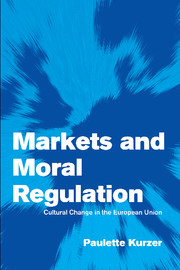Book contents
- Frontmatter
- Contents
- List of tables
- Preface
- 1 Markets versus morality
- 2 Binge drinking: the evolution of alcohol control policy in Finland
- 3 Our greatest social problem: anti-alcohol policy in Sweden
- 4 Nordic morality meets the European Union
- 5 Permissive pragmatism: drug control policy in the Netherlands
- 6 Harm reduction meets the EU: from public health to public order
- 7 Irish moral conservatism and European sexual permissiveness
- 8 The emergence of a European morality?
- Bibliography
- Index
2 - Binge drinking: the evolution of alcohol control policy in Finland
Published online by Cambridge University Press: 16 October 2009
- Frontmatter
- Contents
- List of tables
- Preface
- 1 Markets versus morality
- 2 Binge drinking: the evolution of alcohol control policy in Finland
- 3 Our greatest social problem: anti-alcohol policy in Sweden
- 4 Nordic morality meets the European Union
- 5 Permissive pragmatism: drug control policy in the Netherlands
- 6 Harm reduction meets the EU: from public health to public order
- 7 Irish moral conservatism and European sexual permissiveness
- 8 The emergence of a European morality?
- Bibliography
- Index
Summary
Drinking is a social activity and different cultures assign different meanings to alcohol. Rituals in the Nordic countries centered on drinking distilled liquor outside mealtimes and the main objective was to get drunk. Social occasions were frequently accompanied by binge drinking (sporadic bouts of excessive drinking) and drunkards were a common sight in public spaces. All forms of inebriation arouse moral and political opposition and are considered legitimate terrain for government control. After the 1880s, binge drinking was considered offensive. Temperance associations, growing out of Christian evangelical movements, preached first against spirits and then against drinking, and blamed weak selfcontrol for destructive drinking practices, incompatible with a modernizing society. For many Finns, moreover, binge drinking was indicative of the nation's underdevelopment. National officials argued that the taciturn introvert Finn metamorphosed into an aggressive drunk after drinking even modest amounts of alcohol because Finland was a primitive and insular community and did not yet possess the trappings of higher civilizations. Destructive binge drinking was both a cause and a symptom of Finland's backwardness.
In actuality, Nordic statistics on alcohol production and consumption do not validate this savage imagery of a nation filled with aggressive drunks. Many within agrarian European societies drank excessive amounts of alcohol and “boozing” is typically associated with the use of spirits, not with the level of development of the nation. In both Finland and Sweden, anti-alcohol sentiments arose, not because society was teetering on the verge of permanent intoxication, but rather because social tolerance of a particular drinking style declined. Gradually, the rejection of certain drinking styles spilled over into a rejection of alcoholic beverages generally.
- Type
- Chapter
- Information
- Markets and Moral RegulationCultural Change in the European Union, pp. 27 - 48Publisher: Cambridge University PressPrint publication year: 2001



